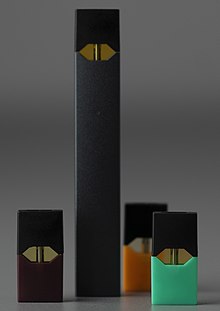
Back جول (شركة) Arabic Джул Лабс Bulgarian Juul (Unternehmen) German ژول لب Persian Juul (entreprise) French Juul HE Juul Armenian Juul ID Juul Italian 쥴 Korean
 | |
 Juul vaping device alongside Mango pod (orange), Mint pod (light green), and Virginia Tobacco (dark brown) | |
| Company type | Private |
|---|---|
| Industry | Electronic Cigarettes |
| Predecessor | Pax Labs |
| Founded | May 22, 2015 |
| Founders | |
| Headquarters | , United States[1] |
Area served | |
Key people | |
| Products | Electronic cigarettes |
| Revenue | $2 billion (2018)[4] |
| Owner | Altria (35%) |
Number of employees | 1,500 (2018)[5] |
| Subsidiaries | VMR Products |
| Website | juul |
Juul Labs, Inc. (/ˈdʒuːl/, stylized as JUUL Labs) is an American electronic cigarette company that spun off from Pax Labs in 2017.[6] The Juul electronic cigarette atomizes nicotine salts derived from tobacco supplied by one-time use cartridges.[7]
Juul Labs was co-founded by Adam Bowen and James Monsees[8] and is headquartered in San Francisco.[1] Altria (formerly Philip Morris Companies[9]) acquired a 35% stake in Juul Labs for $12.8 billion on December 20, 2018.[10] Juul received a $2 billion bonus to distribute among its 1,500 employees.[5]
After a large social media marketing campaign, Juul became the most popular e-cigarette in the United States by the end of 2017 and had a market share of 72% as of September 2018.[11][12][13] Juul also purchased ad space in Seventeen magazine, and on the Nick Jr. Channel TV network. According to documents obtained by the Massachusetts Attorney General's office, Juul bought ads on seventeen different educational, gaming, and crafting sites directed towards middle and high school students.[14] Its widespread use by young people has triggered concern from the public health community and multiple investigations by the U.S. Food and Drug Administration (FDA).[1][15] Given the high nicotine concentrations in Juul, the potential health consequences of its use by young people could be more severe than those from their use of other e-cigarette products.[16]
In 2018, per an investigation by the FDA, Juul agreed to pull certain flavored cartridges (which could entice underage use) from the market. In 2019, the company reached a settlement with the Center for Environmental Health, under which it agreed to scale back and restrict its marketing efforts to those who are appropriately aged. By July 2020, Juul's market share fell to 42%[17] and as of September 2022, it was 28%.[18] A 2022 survey found that Juul is the third most popular e-cigarette brand among middle-school and high-school students, used by 22% of e-cigarette users.[19] On June 23, 2022, the FDA denied authorization for Juul to continue selling its products in the United States, and issued Marketing Denial Orders banning any further marketing or sale of the products effective immediately.[20][21] That order was blocked by the U.S. Court of Appeals in Washington, D.C. the next day.[22]
Juul stopped selling its original device in 2023, introducing the Juul 2.
- ^ a b c Cite error: The named reference
Levi2017was invoked but never defined (see the help page). - ^ Cite error: The named reference
Zaleski2018was invoked but never defined (see the help page). - ^ Cite error: The named reference
Pengwas invoked but never defined (see the help page). - ^ Tiku, Nitasha (December 20, 2018). "Juul Sheds Its Anti-Smoking Cred and Embraces Big Tobacco". Wired. Retrieved December 23, 2018.
- ^ a b LaVito, Angelica; Faber, David (December 20, 2018). "Juul employees get a special $2 billion bonus from tobacco giant Altria – to be split among its 1,500 employees". Silicon Valley Business Journal. Retrieved December 23, 2018.
- ^ Chaker, Anne Marie (April 4, 2018). "Schools and Parents Fight a Juul E-Cigarette Epidemic". The Wall Street Journal.
- ^ Cite error: The named reference
Stahr2015was invoked but never defined (see the help page). - ^ Cite error: The named reference
NewYorkerwas invoked but never defined (see the help page). - ^ Cite error: The named reference
Mole2019was invoked but never defined (see the help page). - ^ Cite error: The named reference
Richtel2018was invoked but never defined (see the help page). - ^ Cite error: The named reference
Craver0818was invoked but never defined (see the help page). - ^ King, Brian A.; Gammon, Doris G.; Marynak, Kristy L.; Rogers, Todd (October 2, 2018). "Electronic Cigarette Sales in the United States, 2013-2017". JAMA. 320 (13): 1379–1380. doi:10.1001/jama.2018.10488. PMC 6233837. PMID 30285167.
- ^ LaVito, Angelica (July 2, 2018). "Popular e-cigarette Juul's sales have surged almost 800 percent over the past year". CNBC. Retrieved October 4, 2018.
- ^ "Commonwealth of Massachusetts vs Juul". Mass Gov. February 12, 2020. Retrieved December 21, 2021.
- ^ Cite error: The named reference
lifewas invoked but never defined (see the help page). - ^ Cite error: The named reference
GalperGrossman2019was invoked but never defined (see the help page). - ^ "E-cigarette market share by brand U.S. 2020". Statista. Retrieved April 16, 2021.
- ^ Craver, Richard (September 20, 2022). "Vuse expands e-cigarette market share lead over Juul to double digits". Winston-Salem Journal. Retrieved October 11, 2022.
- ^ Cooper, Maria (2022). "Notes from the Field: E-cigarette Use Among Middle and High School Students — United States, 2022". MMWR. Morbidity and Mortality Weekly Report. 71 (40): 1283–1285. doi:10.15585/mmwr.mm7140a3. ISSN 0149-2195. PMC 9541029. PMID 36201370.
- ^ Lucas, Amelia (June 23, 2022). "FDA bans Juul e-cigarettes as government pursues broader crackdown on nicotine products". CNBC. Retrieved June 23, 2022.
- ^ Commissioner, Office of the (June 23, 2022). "FDA Denies Authorization to Market JUUL Products". FDA. Retrieved June 23, 2022.
- ^ "Federal Appeals Court puts FDA ban on Juul e-cigarette sales on hold". Reuters. Retrieved July 31, 2022.